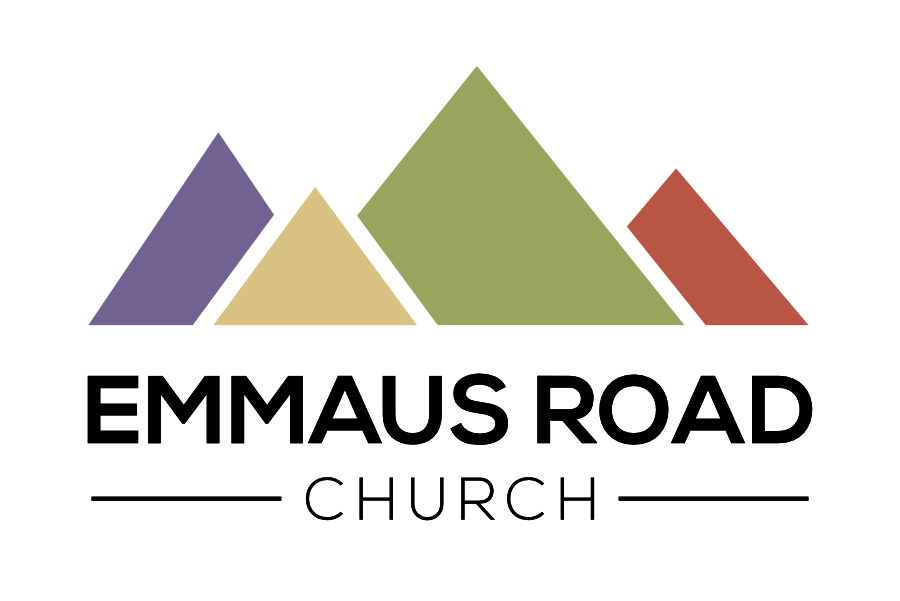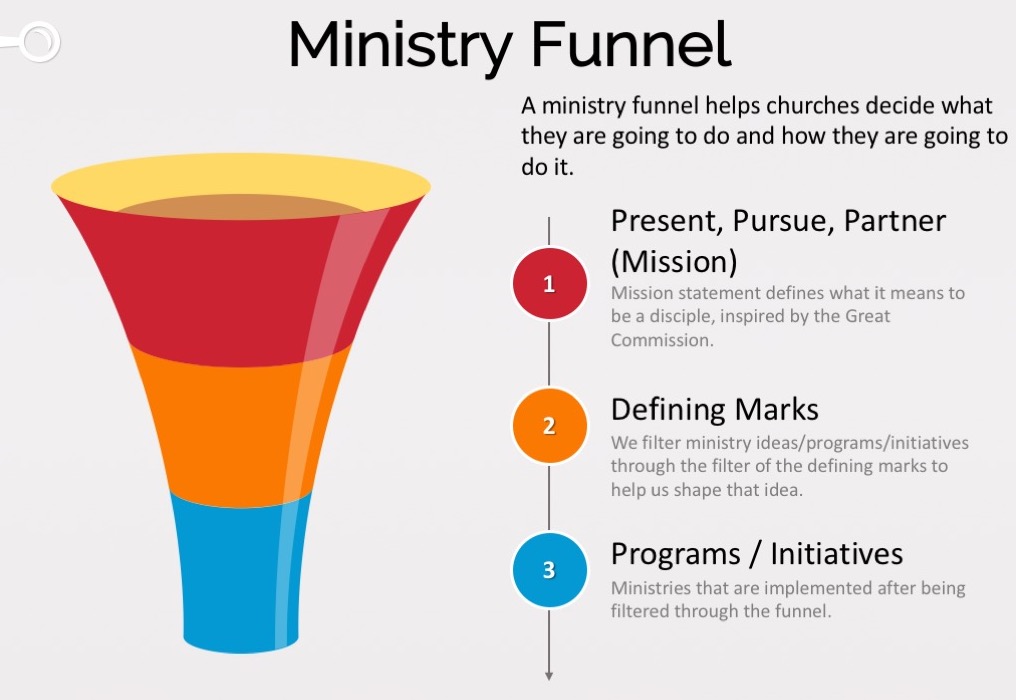Defining Marks
 Over the past few months, we’ve been giving updates about work being done to develop what we are calling “defining marks.” We are excited to finally introduce these defining marks! The purpose of this post is to describe how the defining marks came about, introduce the defining marks, and explain their place in our ministry moving forward.
Over the past few months, we’ve been giving updates about work being done to develop what we are calling “defining marks.” We are excited to finally introduce these defining marks! The purpose of this post is to describe how the defining marks came about, introduce the defining marks, and explain their place in our ministry moving forward.
Getting to the Defining Marks
Last October, our Church Board and Ministry Leadership Team met in the tiny conference room at The Wild Board to talk and dream together about the future of Emmaus Road. In that discussion, we determined that we needed something that would better articulate our identity as a church. That is, we felt we needed to clarify our identity as a church so that we could help ourselves and others understand who we are. Coming out of the retreat in October 2017, we had three key themes that we wanted the defining marks to focus on.
In light of this discussion, a task force was created to author the defining marks. This task force was comprised of our staff, members of our church board, ministry leadership team, and church community.
To begin, Pastors Andy, Grace and Daniel each wrote a statement that fit one of the three key themes. This gave us a place to start, rather than try to have the team of 8-10 people try to write from a blank page.
Once we had a beginning point, the team met several times to discuss and revise these statements. The defining marks statements went through three major revisions until we had a near-final draft.
Once that was created, we sent the statements out to seek feedback from district leadership, other pastors, members of our community, and folks with little church background. That feedback proved very helpful in guiding our final edits.
Introducing the Defining Marks
1. We teach, preach, and practice citizenship in God’s Kingdom.
As the people of God, our allegiance belongs to Christ. We approach life and culture from a Kingdom of God perspective. Empowered by the Holy Spirit, we faithfully engage the world with the hope of the Gospel and participate in God’s renewal of all things. This inspires us to live with compassion, demonstrate love, lament when necessary, and celebrate the goodness of God.
2. We shape our worship to retell the story of Jesus.
As a community, we follow the seasons of the Christian calendar (e.g. Advent, Lent, Eastertide, Pentecost). Each week, our worship consists of celebration, confession, assurance of forgiveness, the preached Word, and communion. We believe these patterns are forming us into the likeness of Jesus.
3. We pursue intergenerational ministry.
As a church, we believe every generation brings value to our community. Therefore, we intentionally connect all generations through worship, service, and fellowship. This promotes spiritual formation and provides a sense of belonging for all ages.
Why Have Defining Marks?
We have defining marks to help articulate our core identity as a church and to help us make ministry decisions (more on that later). These statements are not meant to be a comprehensive description of our church or a church strategy plan. They are meant to articulate what makes us unique. We feel that our particular focus on the kingdom of God, attention to the Christian calendar, and pursuit of intergenerational ministry set us apart as a church, particularly in the evangelical space.
While the statements are not perfect, much care and thought has been taken in authoring these statements. Hopefully, these don’t sound unfamiliar or brand new, but provide language for what we’ve been doing for at least a couple of years now. We hope the defining marks will give you language when talking with others about your church. Imagine you’re sitting in Starbucks with a friend, enjoying an iced tall strawberry green tea infusion while chatting about life, and you say something like: “What I love about my church is we pursue intergenerational ministry. My young children are welcomed in worship, our elementary kids are invited to serve in a variety of ways, and senior adults are involved as well. We love it.” Or you might say, “I love that my church provides space to wrestle with things going on in the world from a kingdom-of-God-perspective.”
What Impact Do These Marks Have On Ministry?
If you’ve attended our Covenant Partner class you may remember that, up to this point, we’ve had a mission statement, core values, and something we called “the code.” Our core values were meant to describe the things that are really important to us as a community. The code was meant to describe the culture of our church (the kind of church we want to be).
As we looked carefully at each of these in our leadership retreat, we realized that between our seven core values, and six statements in the code, it was too much to keep in our head and hearts and therefore had little or no bearing on how we conduct our ministry. They were just words on a page.
Our mission to present Christ as Savior, pursue Christ as King and partner with Christ in service remains the same. But, the defining marks will replace both the code and our stated core values. Don’t worry, we aren’t throwing away our values! Our defining marks still articulate values. In fact, they do it in a much clearer and concise way so that we have a clear ministry funnel.
What is a ministry funnel, you ask? A ministry funnel helps churches decide what they are going to do and how they are going to do it. Every church has a ministry funnel whether they can articulate it or not. It is the filter that ideas are run through to determine if they should be done. If a church doesn’t have a ministry funnel, things can quickly start to feel disorganized.
Imagine a funnel….
At the top of funnel is our mission statement. Every Christian Church’s mission statement is (or should be) inspired by the Great Commission in Matthew 28 to go and make disciples. A mission statement provides direction for the church and articulates what a disciple of Jesus looks like. We believe a disciple of Jesus is someone who presents Christ as Savior, pursues Christ as King and then gives their life away in service to others. This provides direction for our ministry and is the first filter of any new idea – does the idea help us present, pursue or partner. Let’s be honest, almost every idea for ministry fits at the top of the funnel.
In the middle of funnel is our defining marks. We filter ministry ideas, programs, or initiatives through the filter of the defining marks to help us shape that idea. This is much easier to do with the defining marks, than with the combined thirteen items of our code and core values.
At the bottom of funnel are the ministry programs and initiatives that we implement.
Hopefully this helps make sense of how ministry decisions are made and how our programs are shaped. Here’s an example. We recently introduced Faith N’ Film Nights as a new ministry program. Lets run this program through the ministry funnel….
Does talking about films from a faith perspective help us present, pursue or partner? Yes, it helps us pursue Christ as King (discipleship).
How could this ministry be shaped by our defining marks? Well, the first defining mark says we are committed to engage life and culture from a kingdom of God perspective. Films are a huge part of culture, so taking opportunities to engage with popular films is engaging with culture. This means the films at Faith N’ Film night won’t be explicitly Christian films, but popular films that deal with current affairs, ask big questions, or talk about faith themes. When we talk about the film, we’ll explore if the ways of the kingdom are evidenced in the film in some way.
The second defining mark states that our worship is shaped to retell the story of Jesus, so we ask the question, “Are there films that, because of their thematic content, make sense to watch during Lent or Eastertide or Advent, etc.?”
Our third defining mark says we pursue intergenerational ministry, so we ask the question, “Can we make this program intergenerational (if not all the time, then some of the time)?”
This doesn’t mean that every program will always meet all three defining marks, but it does mean that we’ll consider these things when making decisions. Our recent Faith N’ Film night didn’t match any liturgical season, but it was intergenerational and kingdom focused.
Placing the defining marks in the middle of the ministry funnel helps shape what we do and how we do it. We are confident that introducing these defining marks in place of the code and core values will simplify the process of making decision and bring clarity to the what, why, and how we do ministry. We are excited about the future as we conduct ministry with these defining marks in mind.
If you are looking for a church home, we’d love for you to join us! We meet every Sunday at 10:00am.

